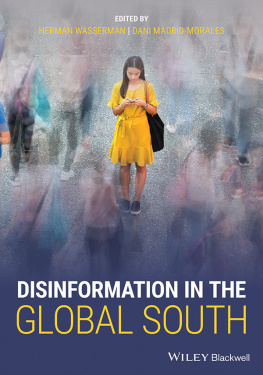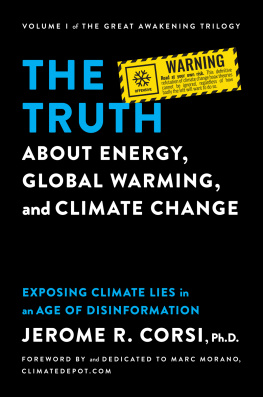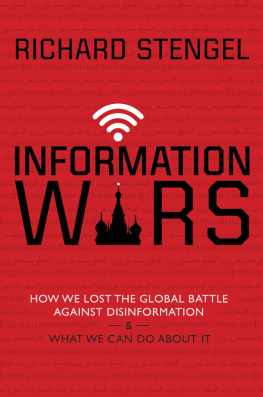Herman Wasserman - Disinformation in the Global South
Here you can read online Herman Wasserman - Disinformation in the Global South full text of the book (entire story) in english for free. Download pdf and epub, get meaning, cover and reviews about this ebook. year: 2022, genre: Politics. Description of the work, (preface) as well as reviews are available. Best literature library LitArk.com created for fans of good reading and offers a wide selection of genres:
Romance novel
Science fiction
Adventure
Detective
Science
History
Home and family
Prose
Art
Politics
Computer
Non-fiction
Religion
Business
Children
Humor
Choose a favorite category and find really read worthwhile books. Enjoy immersion in the world of imagination, feel the emotions of the characters or learn something new for yourself, make an fascinating discovery.
- Book:Disinformation in the Global South
- Author:
- Genre:
- Year:2022
- Rating:3 / 5
- Favourites:Add to favourites
- Your mark:
- 60
- 1
- 2
- 3
- 4
- 5
Disinformation in the Global South: summary, description and annotation
We offer to read an annotation, description, summary or preface (depends on what the author of the book "Disinformation in the Global South" wrote himself). If you haven't found the necessary information about the book — write in the comments, we will try to find it.
Disinformation in the Global South — read online for free the complete book (whole text) full work
Below is the text of the book, divided by pages. System saving the place of the last page read, allows you to conveniently read the book "Disinformation in the Global South" online for free, without having to search again every time where you left off. Put a bookmark, and you can go to the page where you finished reading at any time.
Font size:
Interval:
Bookmark:

Herman Wasserman and Dani Madrid-Morales
This book is based on the view that there is a pressing need for more research on disinformation in the Global South. This view echoes enduring calls to de-westernize the study of communication phenomena, including mediated communication and journalism studies. In this sense, all the chapters in this book are contributing to the expansion of the geographical scope of the growing field of disinformation studies. At the same time, and beyond working toward correcting a clear imbalance in the production of knowledge in the study of communication processes, the pressing need for more research on disinformation in the Global South that we outline here can be explained using one of the key arguments that inform this book and many of the chapters: Disinformation, whether its production, reception, or responses to it, can only be properly understood within the social, political, economic, and historical contexts where it is consumed and spread. Even though research, debate, and popular discourse about disinformation continue to be dominated by perspectives from the Global North, the phenomenon of false information itself has been a much longer-standing problem in the Global South. Given the current prevalence of disinformation in many countries in the Global South, much of which is driven by technological innovations in the media, and the longer histories and sociocultural processes shaping the communication landscape in these regions, several contributors to this volume have reiterated the importance of research that is context-specific. This is in line with one of the goals of this volume, that is, to bring together perspectives that are based upon contextual knowledge and experience.
The preceding chapters feature examples, cases, and evidence from over a dozen countries, most of which can be grouped under the umbrella term of Global South. We understand this term (following Dados and Connell 2012) not only to refer to the geographical regions outside of Europe and North America, i.e., Latin America, Asia, Africa, and Oceania, but also as a designation of geopolitical relations of power. These regions are mostly economically, politically, and culturally marginalized and have historically been the focus of development studies, and designated as the periphery to the core of the industrialized world. The preference for the term Global South to cognate but outdated terms like the Third World also signals resistance to glib notions of neoliberal globalization, and to the persistence of Northern imperialism as manifested in the intersections of economic, social, cultural, and political privilege. In the words of Dados and Connell (2012, p. 13):
NorthSouth terminology, then, like core-periphery, arose from an allegorical application of categories to name patterns of wealth, privilege, and development across broad regions. The term Global South functions as more than a metaphor for underdevelopment. It references an entire history of colonialism, neo-imperialism, and differential economic and social change through which large inequalities in living standards, life expectancy, and access to resources are maintained.
When the phenomenon of disinformation is studied in this context, it becomes evident that countries and regions of the Global South often share experiences and conditions that impact the production, reception, and response to disinformation practices and attitudes. While many of these countries are formally democratic, they have often experienced regressions into authoritarianism or populist politics, characterized by frequent attacks on the media, censorship, or internet shutdowns. Media capture by the state and/or social elites is also common, resulting in low levels of trust in official narratives (including scientific information) and concomitant vulnerability to disinformation narratives. Social histories, community networks, and communication practices characteristic of these regions also impact the likelihood of media users in these regions to consume and share disinformation for reasons such as creating social awareness, contributing to humorous narratives, and acting out of social responsibility. These motivations are often rooted in the particular histories of these contexts, but understanding how these conditions shape disinformation practices can contribute significantly to the discipline, and inform research about the North. Furthermore, contemporary global geopolitical power relations impact the spread of global disinformation narratives in regions of the Global South. Countries in the South are frequently the target of disinformation operations by more powerful countries seeking to expand their profile in this region through influence operations.
With this understanding of the notion of Global South, and against the background of a perceived need for more research on the ways societies in this part of the world engage with disinformation today, all contributions to this volume, regardless of their methodological approach, share a commitment to locate their findings within broader social, political, economic, and cultural contexts, and within historical perspectives. This closing chapter is structured around five key arguments that emerge when reading across contributions: (1) context is paramount in the study of disinformation in the South; (2) many countries in the region are experiencing a growth in the instrumentalization of the phenomenon by authoritarian governments that deserves more scholarly attention; (3) past and present experiences with disinformation in the countries featured in this book call for an expanded research agenda; (4) responses to disinformation need to account for agency and be multi-layered; and (5) disinformation studies from and about the South can contribute significantly to a growing discipline, and inform research about the North. We expand on each of these arguments in the next sections.
When considering disinformation within the specificity of the local context, resonances appear across different settings in the Global South. It becomes clear that, as Saba Bebawi outlines in her chapter on the spread of disinformation in the Arab World, that the phenomenon is entrenched in cultural, political, social, and ideological histories of countries in the region. Bebawi illustrates this by showing how disinformation, often used as a political tool, is rooted in linguistic and cultural practice. These factors are, in turn, reflected in the journalism practiced in countries where the Arabic language is spoken. The prevalence of this type of journalism is the result of complex historical, cultural, and social dynamics and constant changes to all of these factors. The oral culture in the region, and the desire to give preference to the expression of wishful thinking rather than objectively verified facts rooted in reality, has historically been a coping mechanism for people living in the Arab region to deal with their harsh lived experiences, Bebawi explains. Arab journalism historically tended to prefer emotional linguistic expressions, resulting in a tendency for emotive persuasion rather than fact-based reporting. Secrecy is also entrenched in Arab societies, according to Bebawi, presenting an obstacle for journalists when trying to gain access to information, and contributing to a general culture of distrust in the media in the region.
Local contextual knowledge is also important when responses to disinformation in the Global South are designed. This is illustrated in Anya Schiffrin and Peter Cunliffe-Jones chapter, in which they outline how local realities shape the three broad responses most commonly put forward as a response to disinformation: fact-checking, news literacy, and regulation. Countries in the Global South, they argue, require policies in ways that differ from those needed in countries of the Global North. One such contextual factor they identify has been that false claims are often made by politicians and officials in the Global South because they do not expect to be challenged by the media or other institutions. These elected leaders and government officials often amplify the problem of disinformation, as the denialism by Brazils President Jair Bolsonaro and later Tanzanian President John Magafuli during the COVID-19 pandemic showed. Another specific challenge posed by the realities of many countries in the Global South to counter-disinformation efforts is that reliable official data are often very difficult to come by. Despite the rapid growth in the number of fact-checking organizations globally, including in many of the countries featured in this book, Schiffrin and Cunliffe-Jones indicate that these organizations often have to find innovative ways of overcoming hurdles such as verifying claims in multilingual societies marked by low levels of general literacy (as well as low levels of media literacy), poor or highly unequal access to the internet, restrictions on access to official information, and unresponsive or hostile authorities. As several of the chapters in this book describe, including Schiffrin and Cunliffe-Jones contribution, efforts to contain, stop, or counter disinformation in the Global South include teaching media literacy to schools and launching street marketing or SMS campaigns.
Next pageFont size:
Interval:
Bookmark:
Similar books «Disinformation in the Global South»
Look at similar books to Disinformation in the Global South. We have selected literature similar in name and meaning in the hope of providing readers with more options to find new, interesting, not yet read works.
Discussion, reviews of the book Disinformation in the Global South and just readers' own opinions. Leave your comments, write what you think about the work, its meaning or the main characters. Specify what exactly you liked and what you didn't like, and why you think so.









